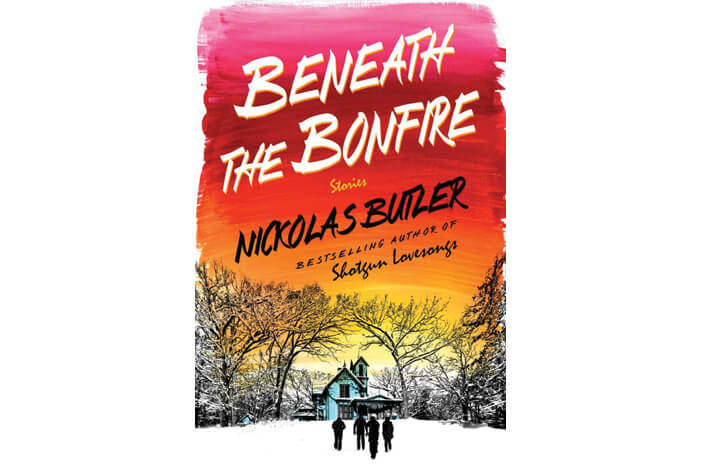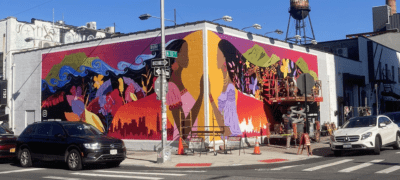That Was Yesterday: Talking with Nickolas Butler about Beards, MFAs, and Life on the Farm


I met Nickolas Butler at the table next to the beer keg in the green room of last year’s Decatur Book Festival. Neither of us knew many people in Atlanta, so Nick, my husband, and I ended up hanging out for most of the weekend. We drank many beers, and one night, we found a fancy restaurant in the rain that served oysters until one or two in the morning. We drank cocktails and feasted. This place was serious—the vinaigrette for the oysters came bottled with an eyedropper.
I went home with a signed copy of Butler’s debut novel, Shotgun Lovesongs, in my bag, and quickly learned that my new Book Fest BFF was kind of a big deal. I mean The New York Times liked his novel so much they reviewed it twice! And his writing—it moved me to tears.
Beneath the Bonfire is Butler’s second book, a collection of short stories that exhibit the same lovely prose and large-hearted spirit as his novel. There’s nothing stingy or guarded about Butler’s writing—he aims high and doesn’t shy away from earnestness. His stories leave me with the sense that I’d know exactly what to say to his characters to ruin their lives. Not that I’d ever do that! But they’re just so clearly laid out on the page, so vivid and vulnerable. Here’s the narrator of “Train People Move Slow” on his mercurial lover: “I did not believe, for instance, that she really heard me, so that most of the time when I told her I loved her it was like talking to someone who had died that you badly missed, someone you wanted to confide in still, but who was gone from the world, except for your memory or idea of them, haunting you like a ghost.”
I talked to Nick about books, family, and his life in rural Wisconsin.
Beneath the Bonfire is a short story collection that comes on the heels of your debut novel. Did you have these stories brewing for a while or were they all written after the novel? What appeals to you about writing short stories? How does your approach to them differ from your approach to a novel?
Most of these stories were written concurrently with Shotgun Lovesongs during my time at the Iowa Writer’s Workshop. I was hesitant to turn in chapters of my novel for peer review, instead choosing to workshop my short stories. I’ve always loved short stories, probably stemming from Jack London’s “To Build A Fire,” but certainly also because of the paperback collections of “great stories of action and suspense” that I often found in my grandparents’ basement. “The Interlopers,” “August Heat,” and “The Most Dangerous Game” come to mind. Short stories were really my entrée into discovering great literature. In terms of approach… I can finish a short story in one-sitting, if I’ve had enough time to think about it, and enough coffee to stay up deep into the evening/morning. You can’t do that with a novel, that kind of exhausting single-sitting writing. My stories are also darker than my novel because I like the shorter form in terms of plunging a reader into some fairly difficult territory for a short period of time.
Wait, you can write a short story in one sitting? Is that typical for you? What’s your writing process like generally? Do you write every day? Are you a beast of drive and efficiency?
Yes, I can write a story in a single sitting, especially if I’ve had sufficient time for an idea to incubate, so that I’m totally mentally prepared before I sit down at the computer. However, obviously that isn’t happening every time I write. Wouldn’t that be wonderful? I’m still trying to figure out exactly what my process looks like, to be honest with you. I’ve got two small kids, so lately, there hasn’t been much writing. All my time has been directed towards taking care of them. The thing about Shotgun Lovesongs and Beneath the Bonfire was that I wrote them both during a period of time in which I was terrified that I might fail, that I might have return to another dead-end job, that I might let my wife down, etc. Those pressures are still present, but my reality is quite different now.
In your story “Sven & Lily,” the narrator, a man nicknamed Lily, comes home from a bar with a broken nose and his disappointed wife tells him, “Be a man.” Many writers would consider barroom misadventures to be the height of literary manliness. Several of your characters struggle with ideas of masculinity (in a way, I should note, that does not bemoan feminism or the Death of Men or anything like that). Can you talk a little about this theme?
Well, I think they’re struggling with being good people; I’m not sure I was necessarily interested in exploring notions of masculinity—that wouldn’t be exactly “new” territory. And, let’s face it: “Literary manliness” has had its day, I think. If my characters misbehave in barrooms, its because I’m portraying an aspect of Wisconsin’s landscape, its culture. Not because I’m trying to be macho or something. I could care less about being construed as “macho”. Right now, for example, I’m watching Daniel Tiger with my daughter. I’m wearing sweatpants, my glasses, fuzzy slippers, and drinking a homemade smoothie.
Between your stories and your luxuriant beard, it’s easy to imagine you in a log cabin in a cold place with lots of land and sky—basically the opposite of Brooklyn. So, can you tell us about your ranch and your writing shack?
Just to clarify, my beard is the veil I wear to conceal an otherwise hideous face. Likewise, I live on 16 acres of land in rural Wisconsin to minimize my contact with the general public, and avoid babies shrieking in alarm at the sight of my visage…
No, my property is very beautiful; it’s what I’ve always wanted. About half of the land is forested, the other half is meadow. My neighbor owns a herd of about 30 buffalo. The view from my bedroom looking south is about an eight-mile vista. We see a lot of deer and turkeys and wild birds; coyotes are everywhere. We’re slowly working to rebuild a number of derelict outbuildings scattered around the property, one of which is about 130 years old. Hopefully that will be my writing studio some day.
If I recall correctly, you were already a married dad when you started your MFA. You’d also had several jobs, and probably a lot more life experience than a lot of your classmates. How did you come to writing? And what was your MFA experience like?
Writing (and reading) has been a constant in my life since I was about thirteen years old. Whether it was writing movie reviews as a teenager, poetry throughout much of my twenties, or lately, fiction, I’ve always been writing. But I totally committed myself to writing, to the notion of becoming the best writer that I could be, when I was about 28, about the time my wife became pregnant with our first kid. I felt a real urgency to succeed, to become better.
Not long after that, I was accepted to the University of Iowa Writer’s Workshop, which was one of the biggest breaks in my life, artistically. For the most part, I loved my time in Iowa City. I feel very fortunate, very blessed to have had that opportunity. How do you quantify your experience studying with Marilynne Robinson, James Alan McPherson, Ethan Canin, James Galvin, Sam Chang? How do you quantify meeting lifelong friends? It was an invaluable experience.
Your stories feel very vivid and lived. You don’t strike me as a dog fighter or a kidnapper, but have you gone foraging for morels? scuba diving beneath bonfires? Do all of your stories take place in settings you know pretty well?
Yes, I think all the stories are set in places that I’m fairly familiar with: The Driftless Area of southwestern Wisconsin, the Eau Claire area (near where I live), northern Minnesota, southern Minnesota… And yes, I do enjoy foraging for morels or cutting firewood, definitely. I didn’t put a lot of thought into the stories’ settings. They just came naturally.
A few of your stories (“Chainsaw Soirée,” “Train People Move Slow,” and more indirectly, “Rainwater”) deal with parenthood in pretty thought-provoking ways—for example, with parenthood chosen or walked into by non-biological parents. Can you talk about how fatherhood has informed your writing?
At the time I was writing these stories, I was a fairly new father, so I’m sure parenthood was pretty paramount in my mind… I don’t know. I think after I became a parent there was a certain anxiety that I felt about the notion of potentially losing my wife (totally unfounded, totally paranoid, I think); like, what would I do if I were left to raise this little person all by myself? How would I do it? I have a deep admiration and respect for single parents. And honestly, my time at Iowa created a certain amount of stress that weighed on my marriage. I’m happy and proud to say that we made it through that time unscathed, but my wife was working full-time as an attorney and taking care of our young son while I commuted between Arden Hills, MN and Iowa City, IA. I’m sure that played a role in my fiction as well.
“In Western Counties” is a pretty wild ride of a story, featuring the abused girlfriend of a dogfighting psychopath and a retired female cop who may or may not be able to help her. It might be my favorite story in this book, so I’m curious: How did this story come about? And please don’t tell me you were able to write it in one sitting.
“In Western Counties” was written in the aftermath of the Michael Vick dogfighting scandal. But dogfighting certainly isn’t just an urban phenomenon; it’s happening in small towns across the country as well. I just can’t imagine deriving pleasure from watching two animals tear each other apart. I can’t imagine “training” an animal for that kind of blood-sport. I just can’t imagine… but I’m fascinated by it. And I liked the idea of two strong central female characters who are bound to each other, and bound to a revenge scenario. I really wanted to write about revenge. And no, I did not write it in one sitting.
Let’s see… favorite authors? Books? What do you like to read and what’re you reading now?Favorite authors… There are so many: Jim Harrison, Rick Bass, Annie Proulx, Thomas McGuane, Ken Kesey, Ernest Hemingway, Cormac McCarthy, Toni Morrison, Willa Cather… I’ve read a string of great books lately, too: Rene Denfeld’s The Enchanted, Rebecca Lee’s Bobcat and Other Stories, Ben Fountain’s Billy Lynn’s Long Halftime Walk, Winter in the Blood by James Welch…
What’re you working on now?
I’m about half finished with my next novel. I’m hoping to have a draft finished by September. It’s about three generations of parents and sons traveling to the same Boy Scout camp over a period of about seventy years of American history… I think it’s about war, parenthood, love, and having some kind of code, some kind of moral or ethical code… The truth is, I’m no goddamn good at marketing or summarizing what my books are about. It might be about the relative merits of olive green vs. khaki uniforms.
You might also like 




















